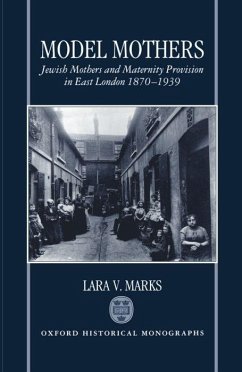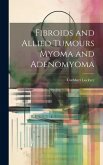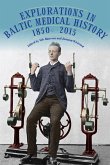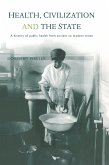Lara Marks assesses the extent to which the stereotype of Jewish mothers reflected the reality of their experience in East London between 1870 and 1939. Not only did they have to cope with extreme poverty, but as newly arrived immigrants had to deal with linguistic and cultural barriers, as well as the unfamiliarity of local medical facilities. Nevertheless, as Dr Marks shows, Jewish mothers and their infants had clearly indicated by the remarkably low rate of Jewish infant mortality, and she examines the reasons for this. Model Mothers makes important contributions to our knowledge of maternal and infant care in this period and to our understanding of the interactions between ethnicity and health-care.
In late nineteenth and early twentieth-century Britain there was deep concern about the perceived physical and military deterioration of the nation, reflected in the diminishing birth rate, persistently high infant mortality, and the poor health of the working class. Many medical practitioners and politicians believed that Jewish mothers were "model mothers" whose exemplary care of their children offered a solution to these problems. Lara Marks assesses the extent to which the stereotype of Jewish mothers reflected the reality of their experience in East London between 1870 and 1939. Not only did they have to cope with extreme poverty, but as newly arrived immigrants they had to deal with linguistic and cultural barriers and the unfamiliarity of local medical facilities. Model Mothers makes important contributions to our knowledge of maternal and infant care in this period and to our understanding of the interactions between ethnicity and health-care.
Hinweis: Dieser Artikel kann nur an eine deutsche Lieferadresse ausgeliefert werden.
In late nineteenth and early twentieth-century Britain there was deep concern about the perceived physical and military deterioration of the nation, reflected in the diminishing birth rate, persistently high infant mortality, and the poor health of the working class. Many medical practitioners and politicians believed that Jewish mothers were "model mothers" whose exemplary care of their children offered a solution to these problems. Lara Marks assesses the extent to which the stereotype of Jewish mothers reflected the reality of their experience in East London between 1870 and 1939. Not only did they have to cope with extreme poverty, but as newly arrived immigrants they had to deal with linguistic and cultural barriers and the unfamiliarity of local medical facilities. Model Mothers makes important contributions to our knowledge of maternal and infant care in this period and to our understanding of the interactions between ethnicity and health-care.
Hinweis: Dieser Artikel kann nur an eine deutsche Lieferadresse ausgeliefert werden.








